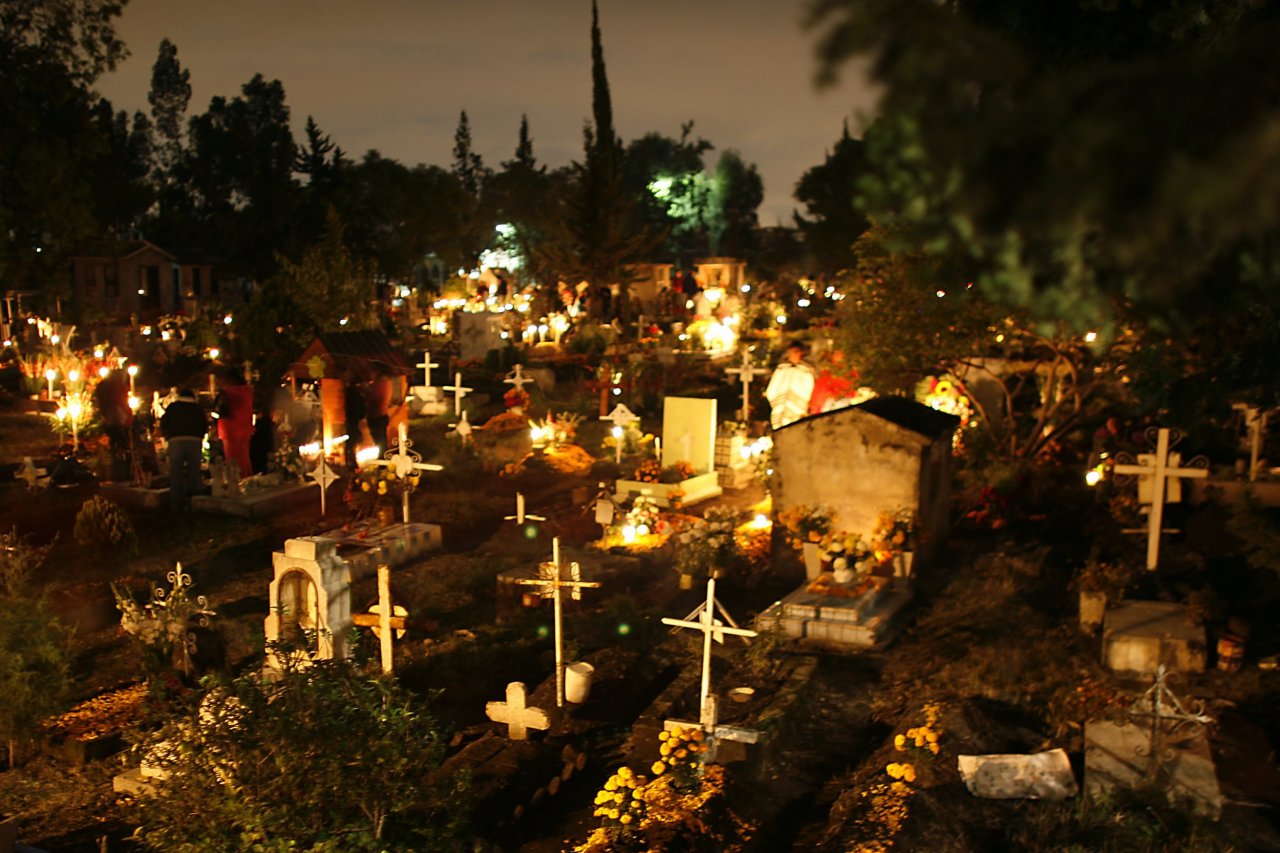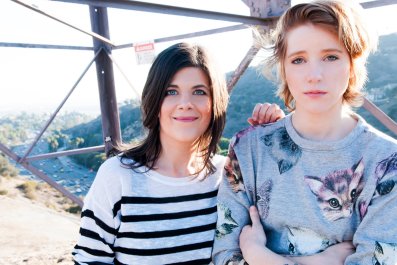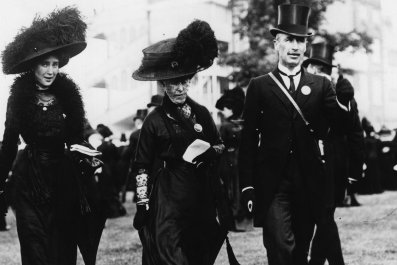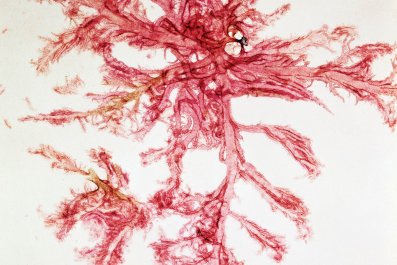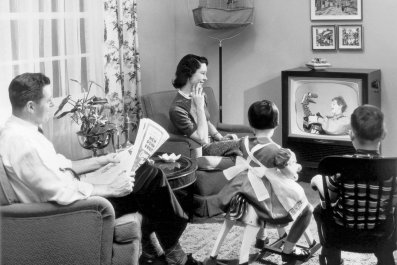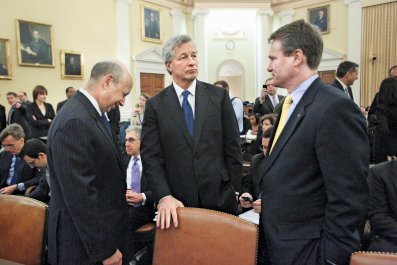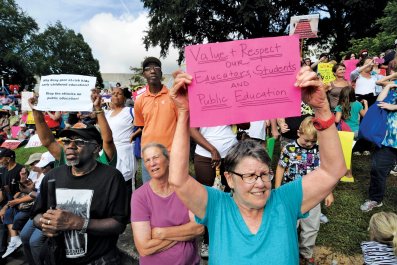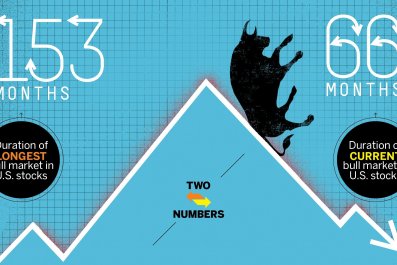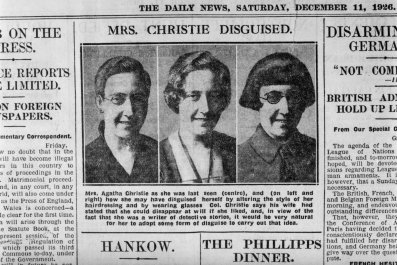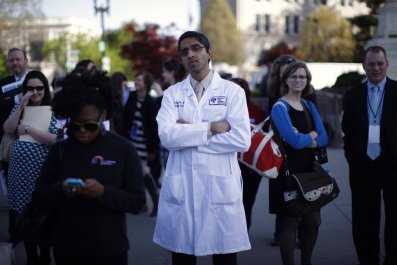There are all kinds of ways in which the dead differ from the living, psychology professor Richard Wiseman told me recently. "And one of them," he said, "is that dead people tend to be rather particular about who they talk to. The dead," he added, "prefer chatting to people who are imaginative. Creative. Highly sensitive." The professor gives a barely perceptible nod in my direction. "You know: the credulous, the gullible and the deluded."
Wiseman is an unusual academic: a former professional magician, he is now Professor of the Public Understanding of Psychology at the University of Hertfordshire, and recognised as Britain's most eminent psychic sceptic. It was possibly an error of judgment to tell him that communication with the dead is an area in which I have had some personal experience. Or – to use a phrase that tends to recur whenever we discuss this subject – so I believe.
It happened six years ago, during an interview with the British medium Sally Morgan: a psychic who, on the strength of having seen both her televised and theatrical shows, I had concluded was not just a strikingly prolific channeller of spirits, but also the biggest charlatan on the block: a title which, in this area of human endeavour, is not easily gained.
Since then, Psychic Sally, who was unavailable for interview, has established herself as the most popular medium in Britain, playing to capacity audiences at venues across the country. Earlier this month I saw the former dental nurse perform at Brighton's Grand Theatre. A peaceful demonstration outside the sold-out 950-seat venue, was led by two men carrying placards which read, "Equal Rights For Gay Ghosts."
This slogan referred to a contretemps with a critic called Mark Tilbrook, who had been handing out leaflets before a performance by Morgan in London this April. Tilbrook only recently released video footage of the encounter, in which Morgan's husband John, a former greengrocer whose ample physique means that he strikes as imposing a figure on the terrestrial plane as his wife does in the ether, approached Tilbrook. Standing shoulder to shoulder with his son-in-law, Daren Wiltshear, he asked the sceptic: "Are you on drugs? Or has one of your boyfriends shagged you too much? . . . I'm gonna knock you out sooner or later. So fuck off before I do you."
Morgan is, according to his wife's 2008 book, My Psychic Life, "the reason the sun rises." In a statement released shortly after this grotesque footage appeared on YouTube, and just before the Brighton show, Sally Morgan asserted that she was, "utterly ashamed and devastated at the behaviour of my husband John and my son-in-law, and neither will have anything to do with my work . . . right now I have no idea what is going to happen to my marriage."
Meeting Psychic Sally
My own encounter with Morgan, now 63, was less confrontational and yet equally disturbing. In those days the medium, who now occupies a large property outside London, was living in New Malden. Walking up the path to the suburban house, where there were no visible lights, no open windows and no signs of recent occupation, I recalled what Sergeant Bilko says to Rupert Ritzik, in an episode of The Phil Silvers Show, as they approach the apartment of a psychic who, they hope, might enable them to make their fortunes at roulette. "It's very quiet," Silvers says. "The blinds are all closed. Nothing is stirring. She must be in."
The reading that Morgan gave me, though, was far from comic, even if, in the long-standing debate over mediumship, she hardly represents an obvious choice as a witness for the defence.
In one to one readings, Morgan works – or did at that time – from photographs. I'd taken a few along, including one of my father, who died while I was a student. A few weeks earlier, in a conversation with my brother, I had raised the possibility that my dad might have been claustrophobic: he was clearly uneasy in crowds, for instance, at packed football stadiums.
Morgan picked up a photo of my parents taken many years ago. "Your father is showing me something in his left hand," she says, "A chain. Could be a key-ring." As I recall thinking at the time, this sort of stuff is the classic material of so-called cold-reading, whereby generalities are dispensed until the sitter blurts out precise information. Then: "Your dad would like you to know that he was claustrophobic but he didn't realise that at the time. They weren't sure what that condition was called."
The evening before I met the psychic, who ran a small laundry before experiencing an epiphany in her local Wimpy Bar, I had been whining to friends about how ill-at-ease I felt in the flat landscape of the southeast, having grown up within striking distance of the Peak District. Pretentious and absurd as this may sound, I had been advancing the theory that I somehow found it easier to write fiction in a place with a view of mountains. Morgan took a sheet of paper and drew four or five undulating lines on it.
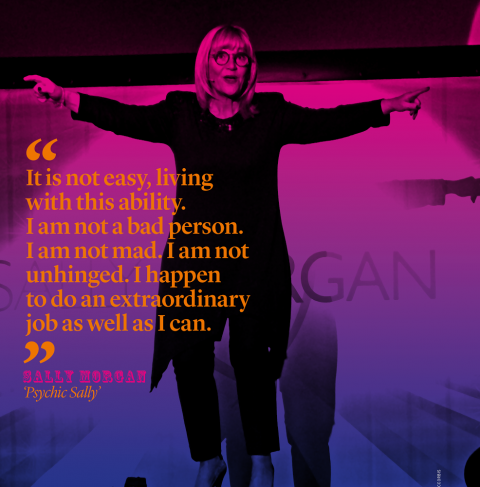
"You would be very, very happy living in an area which is hilly," she said. "Or mountainous. Mountains would inspire you. Your work would flow more easily if you had a vista. This knowledge calls to you. And until you relent and accept that . . . well, if you do, that will change your life for ever."
Years earlier I'd had a conversation with the late Lord Soper, the prominent Methodist minister. He described mediumship as "spiritual fascism. People are looking for answers outside their known world," he'd said, "When what they should be doing is taking responsibility for their own life."
"You know," Morgan said, after I mentioned this, "it's not easy, living with this ability. I am not a bad person. I am not mad. I am not unhinged. I happen to do an extraordinary job as well as I can."
It was when I handed her a photograph of an ex-girlfriend – again without mentioning whether this person was alive, dead, or a relative – that I felt Morgan really caught fire.
"There is a mental side to this girl."
"I'll say."
"Some people might describe her as a nut. There is a very strong sadness in her, and a sense of having been abandoned. Some people destroy relationships before they have run their course because they think they are going to end anyway. She has that feeling." Then, informing me that she has my late father at her side, she picks up the family picture again.
"Who is Joan?"
"My mother."
"And Michael John?"
"My brother."
"Is your mother in spirit?"
"No, she's in Manchester."
"Well," Morgan says, "your mother's mother lost a small child."
"Not so far as I know."
"You'd have to ask her about that."
And when I did, as I later tell Wiseman, my mother told me that she had had an older brother who died very shortly after being born.
The Art of Cold-Reading
As I explain to psychic sceptic Professor Wiseman, I had approached Morgan as a sworn unbeliever.
Before her stage shows, two glass orbs are left on display outside the auditorium. Audience members are invited to fill the globes with messages to, and photographs of, loved ones. These vessels appear on stage with her. Does Morgan read them beforehand? She says not, and we trust her. Yet there is famous footage of "Psychic Sally" giving readings on television shows that gave many viewers the definite sense that the spirit of Google was present.
But the internet, both Wiseman and I agreed, was unlikely to have explained any of the observations she made to me. The names she gave were just about retrievable from an obscure site if you knew what they were in advance and had several hours to spare, but even Wiseman said his sense was that Morgan had not accessed the information in that way. She had certainly mentioned details that meant nothing to me, but not with the scattergun approach that is the hallmark of the true fraud.
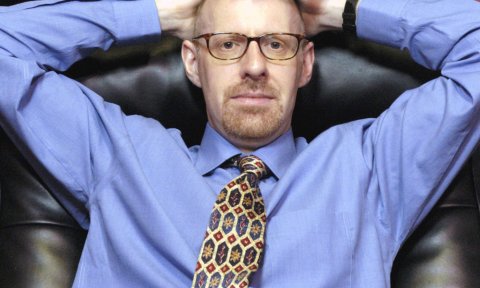
Before I met Morgan, I had interviewed other mediums, such as the thirsty Liverpudlian motorist Derek Acorah, as a result of which I'd had quite a bit of coaching in avoiding being "cold-read" either by word or by body language.
For a definitive lesson in the techniques of cold-reading, watch the first part of the 2010 Channel Four series Derren Brown Investigates entitled, "Talking to the Dead." The episode, posted on Youtube, is an excruciating demolition of the self-professed medium Joe Power.
In the course of the broadcast, Brown's expert adviser, the same Professor Wiseman, examines in detail the skills involved in cold-reading. The medium begins by persuading the sitter that a dead relative is present: an effect commonly achieved with a statement such as "I have a John . . . Johnny . . . Jack, Jake . . . Jackie, Jacqueline . . . could be somebody living in a town that begins with a J."
At this point many sitters relate detailed information that the psychic relays back to them later in the sitting. Blatant "misses," such as meaningless names or dates, become the client's fault. ("Think about it later. It will come to you.")
Flattery is a big part of the process. A medium will never say: "I have your father here. He's telling me that you are a feckless little creep with abject personal hygiene. He is saying that he remembers you mainly as having been 'a waste of food.' He says he could continue, but since he knows you'll be dead in six days he'll carry on this discussion once you join him in hell."
"The main question about your reading with Sally Morgan," Wiseman told me when we met again, with a transcript of the session, "relates to how best you can test mediums."
In controlled experiments, he says, conducted with several sitters facing away from the psychic, subjects have proved to be poor at identifying their own reading. "If you'd had to pick your reading out of six others," he asks, "would you have been able to?"
"Definitely. Even without the small matter of my brother's full name."
"That is interesting," Wiseman says. "We do, undeniably, have an issue with that. Which is why it would be so interesting if Sally Morgan would agree to be blind tested. As far as I know, she has always refused."
Bad psychics cheat in two ways: so-called 'hot reading' (gathering information on the sitter via friends or, these days, via the internet) and the skill of 'cold reading' outlined above.
It is astounding what performers can get away with. Recently I visited a long-established spiritualist church, whose name, out of respect for the other members of the congregation, I will omit. I sat through a 90-minute performance by a psychic, who told me at one point that I had "a close link to the letter P." I was impressed, naturally: but what exact connections from my personal life had he channelled from the spirit world? Peroni? Paula? Prawn dhansak? Pernod? Pamela? Preston North End? Then he entered into the following exchange with a man of about 70, named Harold.
Medium: "I have your mother here."
Harold: "Good. Thank you."
Medium: "Yes. She is cooking. A big stew."
Harold: "My mother never cooked."
Medium: "It is not your mother. It is your grandmother. She cooked big casseroles. There is a dog here. It's white."
Harold: "Black."
Medium: "And the dog's name is . . . Stu."
Harold: "Flossie."
Medium: "Ah. No. The dog is begging for the stew. That's why I got the name Stu."
A Dog Named Stu
And that, I suggest to Sue Farrow, editor and managing director of the journal Psychic News, shows just how very bad things can get. Farrow offers something of a contrast with some who work in this field. She is a highly intelligent, articulate woman, who spent 25 years as a professional musician before taking up her current post in 2007. The "dog called Stu" inspires a snort of derision.
How on earth did a former conductor from the English National Ballet come to be involved in this field? "My motivation derived from a sense that most people are interested in whether there is life after death," she replies. "I feel it is a subject of such importance that it deserves all the scrutiny you can give it. Intellectual curiosity drew me to it."
"So what do you make of Flossie begging for the stew?"
"Of the hundreds of mediums operating in this country," she replies, "there are only three that I would risk recommending to a bereaved person."
To set yourself up as a medium, there is no requirement equivalent of a driving instructor's licence or a football coach's training badge. Anybody can do it.
I travelled to the Arthur Conan Doyle Centre in Edinburgh. Doyle, famously, was a passionate believer in spiritualism and was ridiculed by many, including the magician Houdini, Doyle's one-time friend, who mutated into his Moriarty.
I am welcomed in to a room where there are 13 other trainee mediums, nine of them women (all of whose names have been changed). The session, hosted by a woman called Yvonne, begins with a 15-minute meditation after which, somewhat to my horror, I realise that I, like others in the room, am required to perform a reading myself.
Having been on the receiving end of a lot of cold readings, I find I'm actually quite good at it. My sitter, who I will call Ellen, is an older woman who, without the benefit of spiritual assistance, I sense might have been the victim of physical challenges, possibly involving a male partner, and strong drink.
"I feel that you have had to be the rock, while bad things have been going on around you," I venture, with my first flattering generalisation.
"Yes."
"Bad things done by a man?"
"Sometimes."
"I see you in a bar."
"I don't like alcohol," Ellen says. But her first husband, it transpires, drank heavily and was physically violent.
"You have some connection to Ireland." [Who doesn't?]
"Yes."
I get away with it purely thanks to the truth that, as Wiseman testifies, faced with a flagrant charlatan such as myself, it's the subject, not the "medium", that does the work.
But the Edinburgh class is interesting to observe and not without its merits. These are vulnerable people who visibly draw comfort from this meeting. Their hospitality to outsiders is generous and touching. With the possible exception of a trainee I'll call Laura, a woman whose appearance (not unlike a younger Chrissie Hynde) and forthright attitude make me wonder if this amiable circle has inadvertently admitted another journalist.
"Just what is the point of connecting with spirits?" she asks Yvonne. "They connect to us, then we die. Then we talk to the ones who are left. Why?" Yvonne replies that "Spirits, like people, evolve. But, of course, if someone was a miserable person on earth, they're going to be exactly the same on the other side."
At this point I notice Sheila, a woman on my immediate left, beginning to look emotional. "My father," she says, "had Parkinson's disease for the last 12 years of his life. He was in a terrible state. Are you saying that he's still like that now?"
"No," Yvonne says. "Because he is in spirit. Earthly pain is left behind."
The Psychic Barber
When I asked people – both sceptics and enthusiasts interested in this field – about "good" mediums, the same few names recurred. I chose one, Gordon Smith, the so-called Psychic Barber.
Smith, 52, is an improbable medium. An unpretentious Glaswegian who, as his soubriquet would suggest, began life as a hairdresser, has proved (contrary to the belief apparently harboured by Sting) that it is possible to establish an international reputation without changing your name from Gordon. Smith gives public shows, but does not charge for individual readings. His house – comfortable but not ostentatious – is on the coast near Helensburgh, 30 miles north-west of Glasgow.
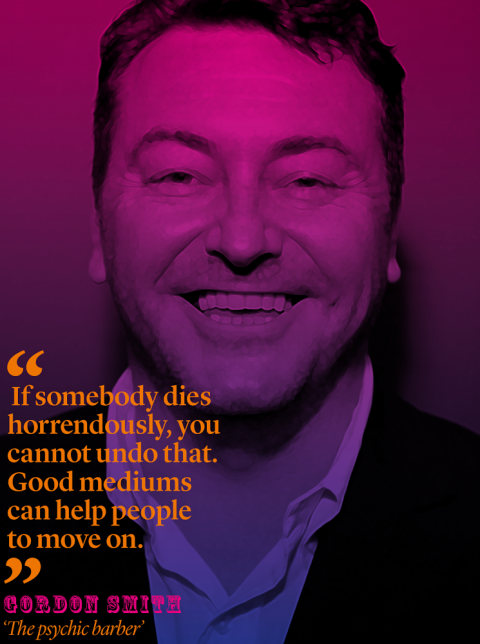
"I think there is only a value to mediumship," Smith says, "if it can help people heal. If somebody dies horrendously, you cannot undo that. Good mediums can help people to move on, by giving them a vision of those individuals in spirit."
"When you give somebody a reading," I ask Smith, who has said he will only do so for me if something, in his words, comes through, "what is going on? What are the mechanics?"
"Something happens between me and that person," he says. "There is a vibration that means there is somebody here. As soon as you walked in the room," he adds, "I saw a very bright light behind you. I have only had it once or twice in my life before. To me it felt good. But I can't really say what it means. It was something, but not to do with my mediumship. I can't say what."
"When mediums say, 'I have your grandfather here' and so on. Are you really communicating through spirits?"
"Yes. Although I think everything we do is connected to telepathy. As a medium, if you don't get a message from spirit then you read the person. I would say that all mediums are psychic. But not all psychics are mediums."
A pause.
"Alright," Smith says, "let's take your mother. She is recently dead [not information I have volunteered] but her spirit is very close. As I speak to you, I get this lady and what I felt was a deep tiredness." Smith switches to the first person, though does not alter his voice.
"'My body just gave up. It almost became like a prison to me. This is what I feel.' But she knew she was loved, and that made it easier for her to die. And now she is at peace."
Smith embarks on what I would say was an accurate character sketch of my mother, which differs from an orthodox medium's reading in that it is not uniquely bland.
"Her temperament was not always the best. She hated how she was at the end. She had such sadness in her own life. And a lot of that sadness, she didn't understand. And now she does. And she doesn't want there to be any anger or guilt." He then gives the first name of one of her very few close surviving relatives.
Smith fell into mediumship, as many seem to, after attending a spiritualist church. He was 24. "I'd never been to that sort of a place. The medium in the church told the person I was with: that guy sat next to you; he's a medium too. Has he not told you?"
I tell Smith that I am concerned by psychics who are trousering vast sums from never-ending tours. Having dismissed one prominent psychic as "cheesy" and "peddling nonsense," Smith adds: "I don't see why this shouldn't be a living. It just was never in me to take money from the bereaved. I'd always worked. Then I got a publishing deal; I did talks. It just escalated."
Some people might argue that were there any real power in spiritualism, Smith should be living on Mulholland Drive in a mansion with a swimming pool in the shape of a racehorse. "You cannot predict the future," he says. "Neither can you cold-read the character or name of somebody who has died. No matter how hard you stare at the sitter. When that happens, it's coming from somewhere else . . . I believe there is a part of you that, after death, somehow endures. I have never thought of the spirit world as heaven as such."
Wasn't it Jonathan Miller, I ask Smith, who said he was surprised when he looked at the complexities of the human eye that people could become obsessed with what he called "so suburban a miracle as telepathy." Does being a medium help the medium?
"It does, yes. Hugely. Because I don't have a fear of dying, I don't have a fear of living. I believe that is very important. So many people are hindered in their lives by a fear of their own death, or the death of their kids. And that's why that sense of a spiritual connection is so very significant and rather beautiful. And you know why that's important? Because if you are not afraid to die," Smith says, "you are not afraid to live."
Robert Chalmers's ebook, Talking With the Dead: Psychic Journeys to the Other Side, is available now through Newsweek Insights.



